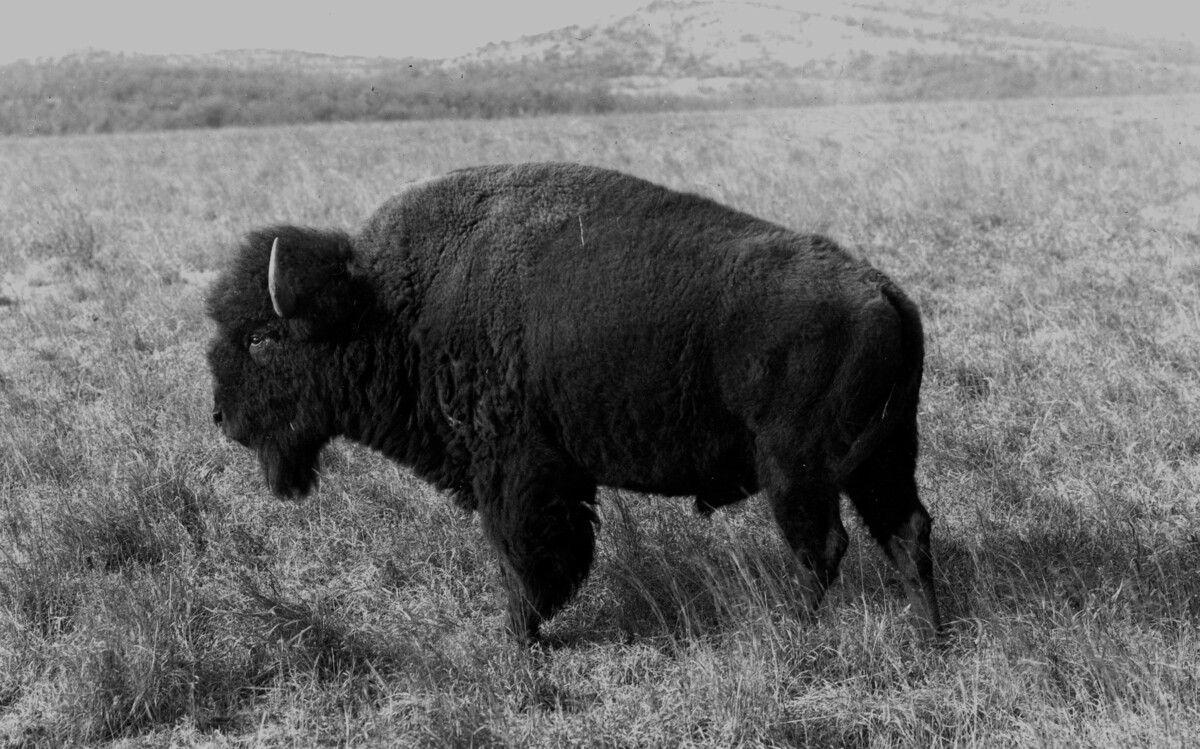The Future of Bison
To recover the bison to its critical ecological and cultural roles, scientists, Indigenous Peoples, government officials, and ranchers must create a restoration strategy at the continental scale. That was a priority when a diverse group of bison experts met at the American Bison Society conference in Pojoaque, New Mexico. These leaders are hoping to advance a bold vision: rewilding the North American bison.
Press Releases
Bison on the Edge
The American Bison Society conference, co-hosted by WCS and Pueblo of Pojoaque, brought together experts from Mexico to Canada to plan future for the iconic species.
Voices
The bison experts at the event represented a diverse set of perspectives. This is key as we look to shape the future of the bison in North America.
In the News
For Bison Day 2021, conservation and reconciliation through buffalo eyes
By Shelly R. Fyant and WCS's Cristina Mormorunni for Mongabay
Indigenous traditional ecological knowledge—so often minimized or just poorly known—can offer us a critical model on how to effectively and holistically address ongoing planetary crises.
National Bison Day
For National Bison Day, a collection of posts to WCS Wild View about America's National Mammal.
Act NowMy Relatives, the Buffalo Nation
By Joseph Gazing Wolf on WCS Wild View
To North America's native communities, relatives are those whose "movement through life and space complements yours in a natural dance that gives meaning to both your existences." The bison, he says, is one such relative.
The Buffalo Way
By Cristina Mormorunni at Medium
In crisis we also opportunities to turn into the storm, rather than away from it, and Face the Wind as we work to create the future that we want and need.
NM Helps Shape Bison Conservation
Joseph Talachy, Roger Fragua, and Cristina Mormorunni for the Albuquerque Journal
"A species’ extinction or designating a national monument were huge triumphs in their time, but are no longer bold enough today."
Bison is a Unifying Icon
John F. Calvelli on Medium
No other native species tells America’s story better than the bison—a symbol of strength and Native American culture.
Assiniboine and Sioux Tribes Gift Bison to the Bronx Zoo
By WCS Newsroom
The seven female and one male bison were from the Yellowstone National Park bloodline, which are among the few pure herds remaining.
Pure Bred Bison Born at the Bronx Zoo
By WCS Newsroom
The calves, born to a herd of 7 females and 1 male that arrived at the zoo from Ft. Peck, Montana, helped the zoo further bison conservation efforts.
A Historic Return of Bison to "Buffalo People"
Harry Barnes & Keith Aune for National Geographic
April 4, 2016, will long be remembered by the Blackfeet Nation, as close to 90 bison calves arrived at the Blackfeet Bison Ranch.
Bison in New Mexico
History

The American bison once numbered around 30 million in North America and traveled in awe-inspiring herds up to 20 miles long. In the early 1900s, though, massive overhunting and changes in land use pushed bison to the brink of extinction until fewer than 1,100 remained.
The American Bison Society (ABS) was formed in 1905 by the first Bronx Zoo director, William Hornaday, President Theodore Roosevelt, and other pioneering conservationists, politicians, and ranchers to prevent the extinction of bison. This effort involved using bison from the Bronx Zoo to repopulate seed stock.
At the time, ABS’s goal was primarily ecological and, when it was clear that extinction had been avoided, ABS wound down. In 2005, WCS and partners re-established ABS with a bold and transformative vision: the cultural and ecological restoration of bison across North America. This is a vision grounded in the recognition of the deep ties between Indigenous Peoples and bison.
In 2016, the bison gained further status in the U.S. when President Barack Obama signed the National Bison Legacy Act to make the American bison the country's official National Mammal.
Much work remains to recover this keystone species to its critical ecological and cultural roles. A priority at the ABS conference was the co-creation of a restoration strategy at the continental scale—one that is Indigenous-led.
WCS Strategies
Sign Up for Email Updates
Get news from the field and learn about ways you can help Earth’s most threatened species.











